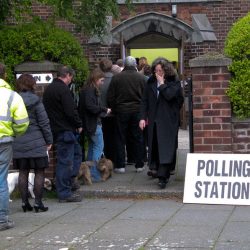There is general agreement that social norms play an important role in explaining why people vote. Despite this the literature on voter turnout has yet to establish the extent to which descriptive and injunctive norms matter, and whether this is conditional on the relationship between political discussants. Most research on norms of voting has focused on the role of civic duty, which can be thought of as a personal normative belief rather than a social norm.
In this article, just published in the British Journal of Political Science, David Cutts and I use political discussion network data from wave 2 of the British Election Study Internet Panel to examine the role of injunctive and descriptive norms on voter turnout. We show that, even when you allow for the role of civic duty and descriptive norms, injunctive norms play an important role in voter turnout.
To understand and assess the impact of norms on voting behaviour we need to measure three different concepts.
- Personal normative beliefs: e.g. “I think it is my civic duty to vote”
- Descriptive norms or ‘empirical expectations’: e.g. “most people I know vote”.
- Normative expectations: e.g. “most people I know think I should vote”.
We find that after allowing for a wide range of network and individual characteristics, including civic duty and whether a discussants asked the respondent to vote (i.e. mobilization), both empirical expectations and normative expectations had an independent effect on the probability of voting in the 2014 European Parliament elections. Moreover, for all network sizes, empirical expectations (descriptive norms) appear to be more important than normative expectations (injunctive norms). To illustrate this more clearly we can visualise the predicted probability of voting by both the number of discussants who voted and the number who approve. We see that for any given number of discussants that voted – that is holding empirical expectations constant – there is an increase in turnout according to the level of normative expectations (how may discussants care about voting).
Probability of voting by number of discussants who vote and who care whether respondent votes in three person networks (when number of discussants=3).
Both variables have substantial effects on the probability of voting. For example, when the respondent has one discussant that cares whether s/he votes, each discussant who votes themselves increases turnout by approximately 7%. Similarly, for a respondent who has one discussant who voted, each discussant who cares whether s/he votes increases turnout by around 6%. For respondents who have three discussants, the overall average marginal effect of empirical expectations (i.e. each additional discussant who votes) is 7% and for normative expectations is 4%.
To see how the role of injunctive and descriptive norms varies by the relationship between discussants we ran separate models for each type of relationship. What is clear from the results is that empirical expectations – or descriptive norms – are especially important for spouses and rather less important for other relationship types. By contrast, the effect of normative expectations is more consistent across relationship types, albeit slightly weaker for neighbours and co-workers. Injunctive norms are actually stronger for family members other than spouse. Overall, the magnitude of the effect of injunctive norms is on a par with descriptive norms except in the case of spouses.
Average marginal effects of dyadic normative (NE) and empirical expectations (EE) by relationship type. Error bars denote 95% confidence interval.
Looking at the interaction between descriptive and injunctive norms our models suggest that injunctive norms matter less if a spouse or family member votes themselves (compared to when the discussant does not vote) insofar as social pressure is less likely to be decisive in the voting decision. Indeed spousal voting is very often a sufficient condition for voting as we show elsewhere.
These findings have important implications for the study of voter turnout and political behaviour more generally. We should not assume that it is possible to measure the effects of normative influences on voter turnout simply by relying on the notion of civic duty. Internalised normative beliefs are important, but voter turnout is conditional on the norms, beliefs and actions of social referents, especially those who are socially most intimate. Moreover, we should also not assume that such normative influence is purely behavioural or descriptive. Whilst, in the case of married couples, it is clear that whether or not a spouse votes themselves is crucial for voter turnout, for all other types of political discussant injunctive norms are equally important (or perhaps more so). It appears that political discussant partners are inclined to not only ‘do as you do’ but also ‘do as you say’. In the age of social media and the proliferation of political information, political discussion with social intimates is still a crucial ingredient creating the social norms which underpin political participation.



